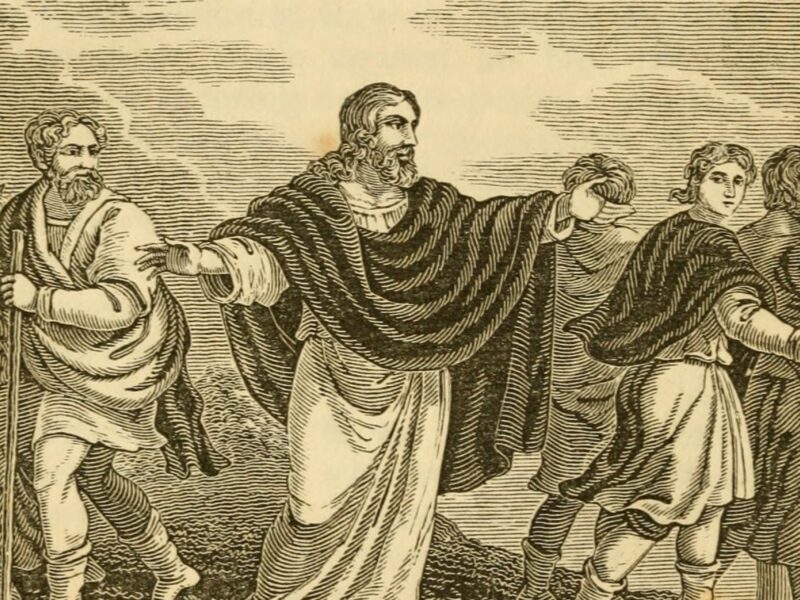
Rulers of the Kings of the Earth
Solemnity of Christ the King. Fr David Sanders wonders how we can share in the kingship of Christ.
As we come to the end of the Church’s year we are given a vision of Christ as the universal king. He is, as Revelation tells us, ‘The Ruler of the kings of the earth’. But then it adds that we too share in his kingship for he has made us ‘a line of kings, priests to serve his God and Father’.
So what is the connection between Christ’s kingship and ours? Is there any link between the way he governs and exercises power and the way we should perform these functions? First we should know what kind of king Christ is and how he exercises power.
For there is no doubt that he has immense power. As the one who fulfils Daniel’s prophecy about the Son of Man, his sovereignty, we are told, ‘is an eternal sovereignty which never passes away nor will his empire ever be destroyed.’ But to understand how he has exercised this power we need to turn to John’s Gospel. And there we get a shock, for in today’s reading Jesus seems powerless. He is arraigned before the powers of the world, standing in front of the Roman procurator Pontius Pilate who starts the interrogation, ‘Are you the king of the Jews?’
Jesus does not deny being a king, just as he did not deny Peter’s acknowledgement that he was the messiah, but this designation is not enough. He does not want to be limited to a kingship of this world: the sort of worldly king which the crowds wanted him to make him after he had had performed the miracle of the loaves.
If he had been this sort of king, dependent entirely on worldly power, his followers would have used force and violence to prevent his arrest. This is the sort of kingship seen throughout world history; it thrives on self-serving ambition, despises weakness and exalts the power of the nationalistic superman. But such a kingship is turned in on itself in inevitable failure.
But does this mean that Jesus kingship is essentially not of this world in the sense that his rule is otherworldly, concerned only with the transcendent realm and detached from any involvement in the compromises of human government? This approach would appeal to many in our own society. They have given up on what they see as the deceit and spin of politics. They prefer to opt out and cultivate their own private, even spiritual, world.
But Jesus does not sanction this escapist approach. At the last supper he had told his disciples that he was not asking God to take them out of the world, only to protect them from evil one so that they could be sent back into the world to bear witness to the truth. For God does not despise the world; in fact he loved it so much that he gave his only Son.
Jesus then is not of the world but he is very much in the world and has a mission to it. In fact he admits that he is a king but his sovereignty is exercised by bearing witness to the truth. He has come from the Father and so he can reveal the truth, a truth which transcends the limitations of an unbelieving world.
Yes I am a king, I was born for this to bear witness to the truth and all who are on the side of truth listen to my word.
But Pilate refuses this truth. With the high priests he embodies the corruption of worldly government. To save his skin, Pilate condemns the one whom he has recognised as innocent and the priests, to preserve their power, acknowledge Caesar as their king. ‘We have no king but Caesar!’
In the midst of this hostile world Jesus bears witness to God’s kingdom. St John does not use the language of kingdom but rather focuses on the way Jesus embodies the truth. ‘I am the truth’, he claims. If we want to see what happens when God’s rule is present in a human being — look at Jesus. Behold the man. And what do we see? A man mocked as a king, crowned with thorns, arrayed in a purple cloak and then finally lifted up on to the throne of the cross.
The pretensions of worldly kingship are mocked but as the crucified Christ reigns from the cross he reveals the self giving love of God and it possesses a power which can draw all men and women into his kingdom. In fact on the cross his kingship is universally proclaimed in Hebrew, Latin and Greek.
As we come ourselves to worship Christ the King on this final Sunday of the Church’s year how can we exercise the kingship he has given to us through baptism? We do not achieve this by escaping into a private world. Rather, by bearing witness to the truth in our political worlds we can acknowledge his universal rule in our lives and then pray that his kingdom may become fully present on earth as it is in heaven.


